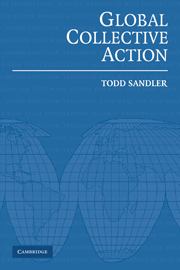Book contents
- Frontmatter
- Contents
- Tables and Figures
- Preface
- 1 Future Perfect
- 2 “With a Little Help from My Friends”: Principles of Collective Action
- 3 Absence of Invisibility: Market Failures
- 4 Transnational Public Goods: Financing and Institutions
- 5 Global Health
- 6 What to Try Next? Foreign Aid Quagmire
- 7 Rogues and Bandits: Who Bells the Cat?
- 8 Terrorism: 9/11 and Its Aftermath
- 9 Citizen against Citizen
- 10 Tales of Two Collectives: Atmospheric Pollution
- 11 The Final Frontier
- 12 Future Conditional
- References
- Author Index
- Subject Index
6 - What to Try Next? Foreign Aid Quagmire
Published online by Cambridge University Press: 19 January 2010
- Frontmatter
- Contents
- Tables and Figures
- Preface
- 1 Future Perfect
- 2 “With a Little Help from My Friends”: Principles of Collective Action
- 3 Absence of Invisibility: Market Failures
- 4 Transnational Public Goods: Financing and Institutions
- 5 Global Health
- 6 What to Try Next? Foreign Aid Quagmire
- 7 Rogues and Bandits: Who Bells the Cat?
- 8 Terrorism: 9/11 and Its Aftermath
- 9 Citizen against Citizen
- 10 Tales of Two Collectives: Atmospheric Pollution
- 11 The Final Frontier
- 12 Future Conditional
- References
- Author Index
- Subject Index
Summary
Past demonstrations in Seattle, Washington, DC, Genoa, Stockholm, and elsewhere against the World Bank, the International Monetary Fund (IMF), and the World Trade Organization (WTO) have highlighted criticisms not only of globalization but also of foreign assistance practices. It is ironic that well-intended actions to improve the welfare of those less fortunate can lead to such outbursts of rage and indignation that even resulted in the death of one demonstrator in Genoa in June 2001. James D. Wolfensohn, the President of the World Bank, must now have bodyguards to protect him. These multilateral institutions have had to deploy greater security and brace themselves for demonstrations and violence during their major meetings. Such rage comes from a belief by some that these institutions have either failed in their mission or their policies have harmed some constituents by promoting an agenda of the rich. The proof is circumstantial but powerful: the growing inequality worldwide and a developing world mired in misery, poverty, and conflict.
Despite hundreds of billions of dollars of foreign aid given to developing countries since the end of World War II, many recipient countries are still poor with heavy debt burdens and apparently little to show for past loans and grants. Foreign assistance in the form of the Marshall Plan was, nevertheless, instrumental in helping war-ravished economies recover following World War II. In the latter case, these countries had a well-educated population, entrepreneurial skills, a development vision, and market-promoting institutions (for example, contract laws and a central banking system). In recent years, some Asian economies – for example, South Korea, Singapore, Thailand, and Taiwan – have effectively used foreign aid in underwriting their development.
- Type
- Chapter
- Information
- Global Collective Action , pp. 122 - 143Publisher: Cambridge University PressPrint publication year: 2004



